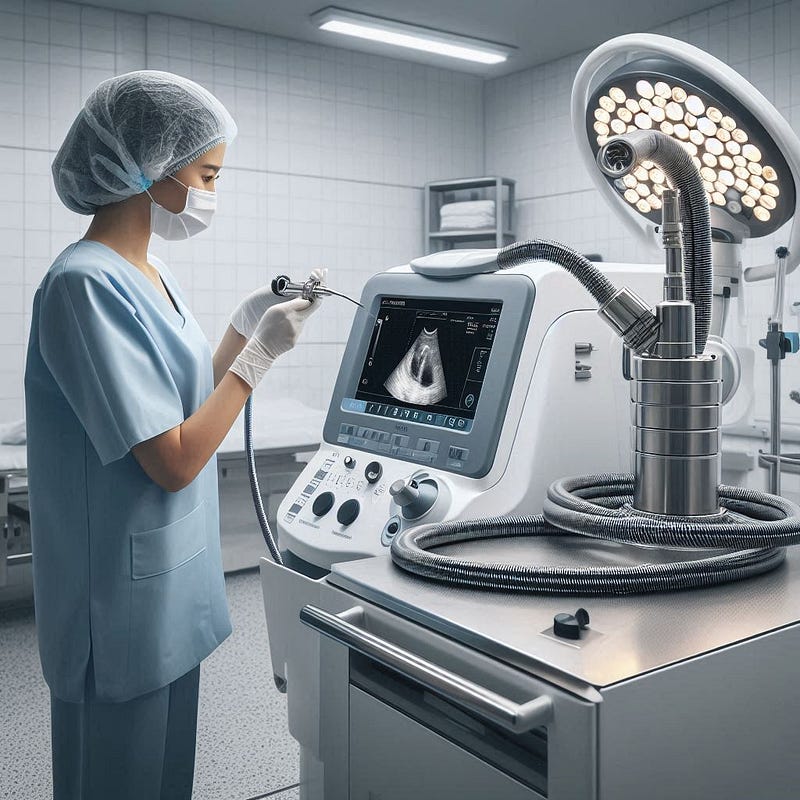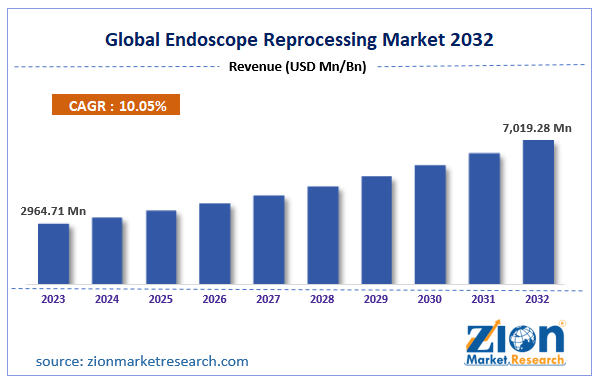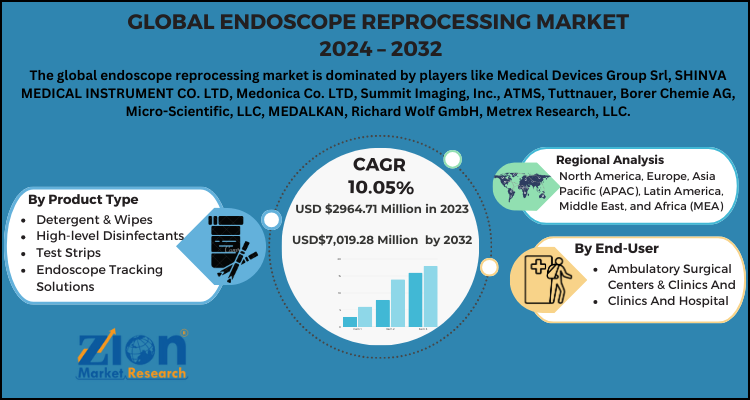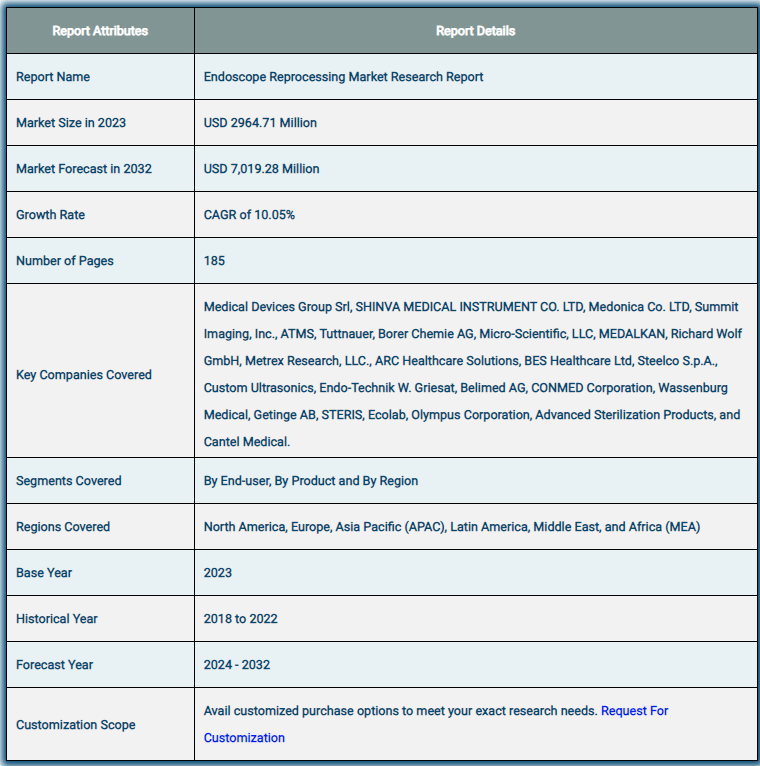Endoscope Reprocessing Market Size, Share, Growth Report 2032

The global endoscope reprocessing market was estimated to be worth USD 2964.71 million in 2023 and is expected to grow to USD 7,019.28 million by the end of 2032, according to a report released by Zion Market Research. Over the course of the projected period, the market is anticipated to increase at a CAGR of 10.05%. The development prospects, challenges, and effects on demand for the global endoscope reprocessing market are examined in this report’s analysis. It will also assist in navigating and investigating the prospects that present themselves in the Endoscope Reprocessing Market sector.
✈👉Get a Free Sample: 🚀https://www.zionmarketresearch.com/sample/endoscope-reprocessing-market
Introduction
The endoscope reprocessing market has become increasingly critical as healthcare facilities focus on ensuring patient safety and adhering to stringent infection control standards. Endoscopes are essential medical devices used in diagnostic and therapeutic procedures across gastroenterology, urology, and other specialties. Since they are reusable, proper reprocessing is vital to prevent healthcare-associated infections (HAIs). This market comprises technologies and solutions designed to clean, disinfect, and sterilize endoscopes between procedures. With growing awareness of infection control, evolving healthcare regulations, and technological advancements, the endoscope reprocessing market is poised for significant growth.
Overview of the Global Endoscope Reprocessing Market
The global endoscope reprocessing market was valued at approximately $X billion in 2023 and is projected to grow at a compound annual growth rate (CAGR) of XX% from 2024 to 2030. Factors driving the market include the increasing prevalence of minimally invasive procedures, stringent infection control regulations, and advancements in reprocessing technology. The introduction of automated reprocessing systems and the increasing adoption of disposable endoscopes are also shaping the market landscape.
Medical equipment is sterilised, cleaned, and disinfected as part of the endoscope reprocessing process. Several processes are involved in the endoscope reprocessing process, including storage, drawing, cleaning, disinfection, secondary rinsing, and rinsing.

Growth Factors for the Global Endoscope Reprocessing Market
One of the main reasons propelling the expansion of the worldwide endoscope reprocessing market is the rising demand for endoscopic treatments along with the rising risks of endoscope-associated infections. The use of infected endoscopes is the source of endoscope-associated illnesses. Multiple bacterial infections are caused by improperly reprocessed endoscopes. Epidemics related to endoscopes, bronchoscopes, and gastroscopes are caused by endoscope-associated infections. Because they persist in biofilms, Pseudomonas aeruginosa and Klebsiella pneumoniae are the main endoscopic outbreaks.
Additionally, biofilm formation is prone to occur in the damage path, including biopsy channels, due to high wear and tear. The world’s ageing population combined with an increasing number of endoscopic operations being performed is expected to fuel the expansion of the endoscope reprocessing market globally over the course of the projected period. Furthermore, there is a notable change in the global healthcare authorities’ attention on improving the reprocessing guidelines. The Covid-19 outbreak will have a beneficial impact on how the worldwide endoscope reprocessing market develops. The main concern in otolaryngology and pulmonology to reduce the risk of coronavirus infection is proper endoscope reprocessing.

The worldwide market for endoscope reprocessing will expand at a faster rate due to hospitals’ increasing investments in endoscopic equipment. Furthermore, there will probably be a greater need for appropriate endoscope reprocessing due to the expanding use of endoscopic instruments in both illness detection and treatment. However, more sophisticated methods for endoscope reprocessing are probably going to be introduced in the upcoming years due to the expanding technical breakthroughs in the medical industry.
Segmentation of the Global Endoscope Reprocessing Market
Segmenting the global endoscope reprocessing market based on end-user, product, and region is possible.
The market can be divided into hospitals and ambulatory surgery centres & clinics based on the end-user. Due to increased financing from the government and well-known industry leaders, the hospital segment holds the greatest share of the worldwide endoscope reprocessing market. The sector will continue to grow as a result of the increasing government initiatives to improve healthcare infrastructure around the world. On the other hand, the increasing number of endoscopic procedures performed in hospitals is probably going to sharply accelerate the segment’s growth in the next years.
The market can be divided into endoscope tracking solutions, automated endoscope reprocessors, drying storage and transport systems, detergents and wipes, high-level disinfectants, and test strips according to product categories. The increasing frequency of endoscopic-associated outbreaks with insufficient disinfection for cleaning has led to the segment in the worldwide endoscope reprocessing market that is largest in terms of disinfectant and test strip sales. The increasingly stringent regulations surrounding endoscope reprocessing will also contribute to the segment’s growth.
✈👉Directly Purchase a copy of the report with TOC: 🚀https://www.zionmarketresearch.com/toc/endoscope-reprocessing-market
Market for Endoscope Reprocessing: Report Scope

Regional study of the global endoscope reprocessing market
Due to the rising number of endoscope-related outbreaks in the region, North America holds the highest share of the worldwide endoscope reprocessing market. The region’s strong healthcare infrastructure will support the regional market’s expansion even further. In addition, the region’s favourable reimbursement regulations will promote the adoption of endoscopic procedures by the populace, hence spurring market expansion in the area.
In the upcoming years, Asia Pacific is anticipated to increase at a substantial rate because of rising government attempts to prevent endoscope reprocessing epidemics in the region and rising levels of disposable income among the populace.
Key Market Drivers
- Rising Incidence of Healthcare-Associated Infections (HAIs)
HAIs remain a significant concern for healthcare providers worldwide, leading to a heightened focus on proper disinfection and sterilization procedures. Contaminated endoscopes are a leading cause of HAIs, and the need to reduce these risks is driving the demand for advanced reprocessing solutions. - Stringent Regulatory Standards
Regulatory bodies such as the U.S. Food and Drug Administration (FDA), the European Medicines Agency (EMA), and international health organizations have implemented strict guidelines on endoscope reprocessing. Compliance with these standards requires healthcare providers to adopt more effective reprocessing technologies and protocols, thereby driving market growth. - Technological Advancements in Reprocessing
The market is witnessing rapid innovation, with manufacturers introducing automated and high-efficiency reprocessing systems. These systems are designed to reduce manual intervention, ensure consistent disinfection, and minimize human error. Additionally, new disinfectants and sterilization agents are being developed to enhance the efficacy of the reprocessing process. - Growth of Minimally Invasive Procedures
The increasing preference for minimally invasive surgeries and diagnostic procedures has led to a rise in endoscope use across medical facilities. As endoscope usage grows, so does the need for efficient reprocessing systems to prevent contamination and ensure the safety of patients and healthcare professionals. - Disposable Endoscopes Gaining Popularity
While reusable endoscopes are the mainstay of many healthcare facilities, there is growing interest in disposable endoscopes as a means to eliminate reprocessing-related risks entirely. The shift towards single-use endoscopes in certain cases presents both a challenge and an opportunity for the reprocessing market.
Market Segmentation
The endoscope reprocessing market can be segmented by product type, end-user, and geography.
- By Product Type:
- High-level Disinfectants & Detergents
- Automated Endoscope Reprocessors (AER)
- Endoscope Drying, Storage, and Transport Systems
- Endoscope Tracking Solutions
- Reprocessing Accessories
- Others (Sterilization Devices, etc.)
- By End-User:
- Hospitals
- Ambulatory Surgery Centers (ASCs)
- Diagnostic Clinics
- Specialty Clinics
- By Geography:
- North America
- Europe
- Asia-Pacific
- Latin America
- Middle East & Africa
Challenges
Despite the rapid growth in the endoscope reprocessing market, several challenges persist:
- High Costs of Reprocessing Systems
Advanced reprocessing equipment, such as Automated Endoscope Reprocessors (AERs), comes with significant costs, limiting adoption, especially in smaller or underfunded healthcare facilities. - Risk of Incomplete Reprocessing
Even with advanced systems, there is always a risk of incomplete or inadequate reprocessing due to human error or device complexity. Ensuring thorough and consistent reprocessing remains a challenge. - Growing Preference for Disposable Endoscopes
The rising demand for single-use, disposable endoscopes, particularly in infection-sensitive settings such as critical care and ICU, could reduce the reliance on reprocessing systems in specific sectors, potentially slowing market growth in those areas.
Opportunities for Growth
- Development of AI-Powered Reprocessing Solutions
The integration of artificial intelligence (AI) in reprocessing systems presents a significant opportunity for enhancing accuracy, automation, and consistency in disinfection and sterilization processes. AI-powered systems can provide real-time monitoring, alerts, and quality assurance, improving patient safety and reducing HAIs. - Expanding Healthcare Infrastructure in Emerging Markets
The increasing investment in healthcare infrastructure across emerging markets in regions like Asia-Pacific, Latin America, and Africa presents a significant growth opportunity. As healthcare facilities in these regions upgrade their equipment and infection control protocols, the demand for endoscope reprocessing systems will rise. - Rising Demand for Endoscope Tracking Solutions
Tracking and traceability of endoscopes throughout the reprocessing cycle are becoming increasingly important. Digital tracking solutions help ensure compliance with regulatory standards and reduce the likelihood of errors, creating opportunities for manufacturers to innovate in this space.
Competitive Landscape
The endoscope reprocessing market is highly competitive, with several key players dominating the landscape. Major companies in the industry include:
- Olympus Corporation
- Medivators Inc. (Cantel Medical)
- SteriTrack Inc.
- Ecolab Inc.
- Getinge AB
- Johnson & Johnson (ASP)
- Custom Ultrasonics Inc.
- Steelco S.p.A.
These companies focus on product innovation, mergers and acquisitions, and strategic partnerships to strengthen their market positions and enhance their product offerings.
Conclusion
The endoscope reprocessing market is poised for substantial growth as the demand for infection control solutions in healthcare settings intensifies. Technological advancements, stringent regulatory standards, and a focus on patient safety are the primary drivers behind this expansion. However, the market must address challenges such as the high cost of equipment and the rising popularity of disposable endoscopes. Looking ahead, emerging markets and innovations in AI-powered and automated reprocessing systems present significant opportunities for growth.
Future Outlook
By 2030, the endoscope reprocessing market is expected to see increased automation and digitalization, improving efficiency and compliance. The role of reprocessing in infection control will continue to grow as healthcare providers prioritize safety and patient care, driving further advancements in this crucial aspect of medical device hygiene.
✈👉Enquiry for buying: 🚀https://www.zionmarketresearch.com/inquiry/endoscope-reprocessing-market
get to know better
Microneedle Drug Delivery Systems Market
Marine-derived Pharmaceuticals Market
Contact Us:
Zion Market Research212
USA/Canada Toll Free: 1 (855) 465–4651
Newark: 1 (302) 444–016611\
Web: https://www.zionmarketresearch.com/
Blog: https://zmrblog.com/
%20Market%20main%20jpg.png)
Comments
Post a Comment